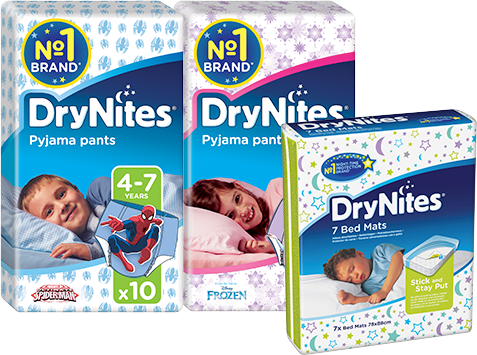Helping your child
It’s natural for your child’s bedwetting to leave you feeling disheartened, frustrated and concerned. However, this is a perfectly common development phase for many children and they will likely become dry in their own time. That being said, there are a few things you can do which will help you manage the situation:
Stick to a good routine
A consistent routine is important to help your child learn to stay dry at night. Try to make sure it involves some quiet time together and a last wee before lights out.
Help them understand
Particularly at a young age, children are unlikely to understand why they are wetting the bed, so explain what’s going on. Be clear that it isn’t their fault and reassure them that they will become dry at night in good time.
DryNites® Pyjama Pants
DryNites® Pyjama Pants are an effective way to help manage bedwetting, and work well together with other methods and solutions. With 5 layers for maximum protection, they ensure a good night’s sleep and help with your child’s development and self-esteem. They also give your child a sense of independence with their discreet design.
If you notice that your child’s DryNites® are dry for a few mornings in a row, try without. If your child has an accident in bed, go back to DryNites® and try again later on. Remember, wetting at night can be common and your child will become dry at night, in their own time.
Monitor drinking levels
It’s important for your child get plenty to drink during the day. However, fizzy and caffeinated drinks are best avoided, especially before bed. In general, you shouldn’t deny your child some water if they’re thirsty. Encourage regular toilet use – between four to seven times a day is normal.
In some cases, your doctor may prescribe anti-diuretic medication (available as a tablet or a melt to put under the tongue). This can be useful for particular situations like when a child spends the night away from home, however, they do not work for every child, and are only a temporary solution.


